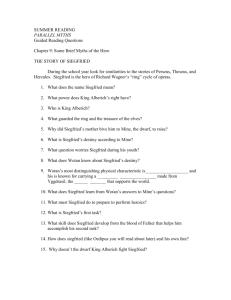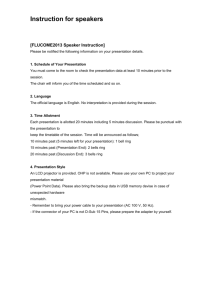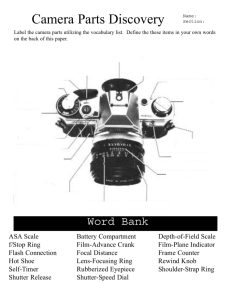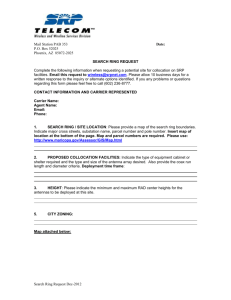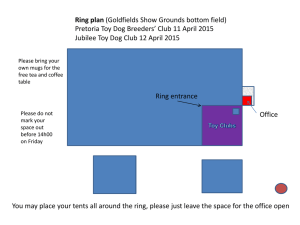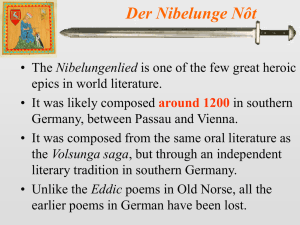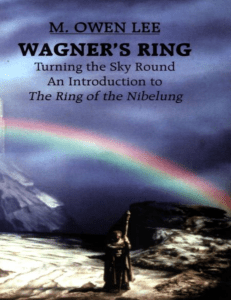THE BEST MODERN RECORDING GRAMOPHONE SEP/2007 Reviewed: Gramophone
advertisement
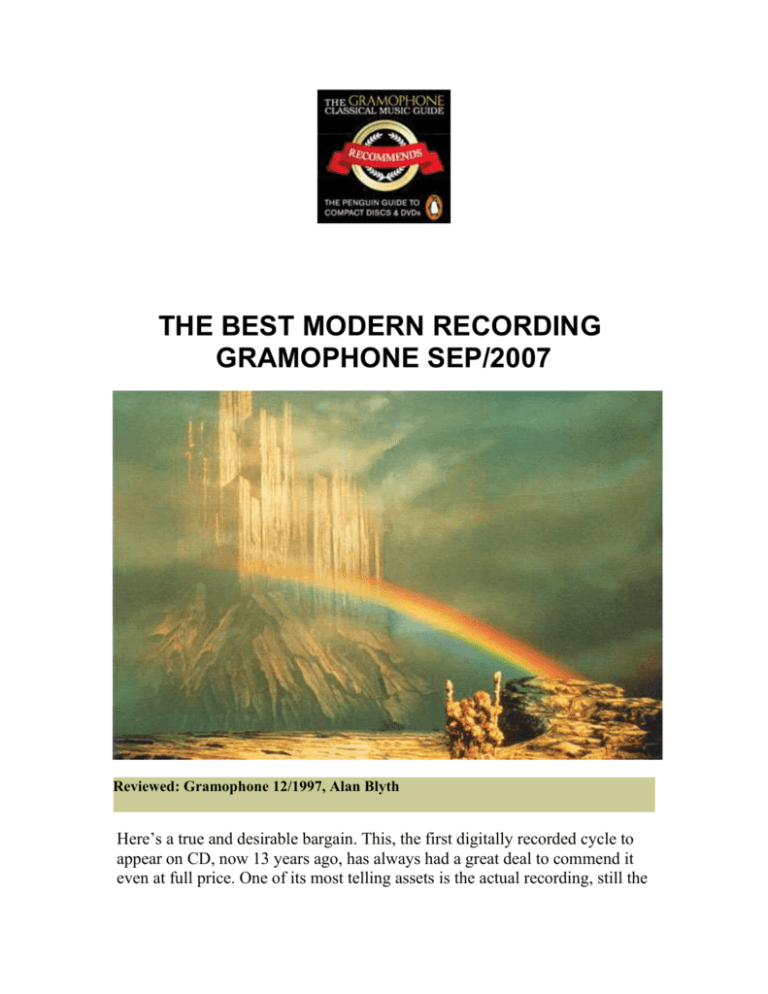
THE BEST MODERN RECORDING GRAMOPHONE SEP/2007 Reviewed: Gramophone 12/1997, Alan Blyth Here’s a true and desirable bargain. This, the first digitally recorded cycle to appear on CD, now 13 years ago, has always had a great deal to commend it even at full price. One of its most telling assets is the actual recording, still the most natural, clear and most sensitively balanced available. Then it has the Dresden Staatskapelle playing with the utmost beauty from start to finish – try the start of Act 3 of Gotterdammerung – and with lean power when that’s called for. There’s no feeling, as with some of its predecessors or successors, that the orchestral sound is being artificially boosted: voices and players are in an ideal relationship. Which is not to say that such purple passages as the Magic Fire Music, Ride of the Valkyries, Rhine Journey and Funeral March want anything in visceral excitement. Janowski conducts a direct, dramatic interpretation, concerned throughout with forward movement. His clear-sighted conducting, based on textural clarity, conveys theatrical excitement from start to finish without fuss or attempts at portentous readings. Janowski sees the cycle more as the culmination of what has gone before in the nineteenth century rather than as a new art. All this makes it an ideal introduction to the Ring for any young collector, who can later go on to more philosophically inclined interpretations. Even I, after very long Wagnerian duty, found myself again enthralled by these recordings. The casts are by and large excellent. Das Rheingold is dominated by three central performances – Nimsgern’s vibrant, articulate Alberich, Schreier’s wonderfully vital, strikingly intelligent and articulate Loge and Adam’s experienced Wotan. But Fricka, Giants and Rhinemaidens are all well cast, and the whole performance grips one’s attention from start to finish as the kaleidoscopic drama unfolds. Die Walkure introduces us to Norman’s involving if not wholly idiomatic Sieglinde and, even better, the youthful Jerusalem’s near-ideal Siegmund, forthright and sincere, not forgetting Moll’s granite Hunding. Adam is so authoritative, so keen with the text, so inside his part that an occasional unsteadiness can be overlooked. With Altmeyer’s Brunnhilde we come to the one drawback of the set. Though in this and the succeeding operas, we are thankful for such clear, clean and youthful tone, her reading is unformed and one-dimensional, lacking the essential insights of a Varnay or Behrens. The other Valkyries need to be mentioned because they include singers such as Studer, soon to go on to greater things; as such they stand out among recorded broods. In the title-role in Siegfried Kollo gives one of his most attractive portrayals on disc, full of thoughtful diction poised on clear-cut tone. Schreier misses nothing in his interpretation of the dissembling, wily Mime, Adam is at his very best as the wise, old Wanderer, and the smaller parts are well catered for. In Gotterdammerung, Salminen is a commanding, often subtle Hagen, though inclined to bark in his call, Nocker a splendid Gunther. Kollo is here harder pressed than in the previous work, and inclined to force, but as ever his musical singing compensates for the faults. Altmeyer fails to dominate as she should, but is never less than adequate, sometimes more than that. Again the smaller parts, especially Rhinemaidens, led by Popp, are well taken. Alan Blyth The All-Purpose RING Reviewer: F. P. Walter No, you'll never hear a perfect RING. There are just too many variables, options, and difficulties; plus it's an organic entity that takes over 15 hours to stage, so the law of averages automatically kicks in: when you've got more things that can go wrong, more WILL go wrong. And so it is with its multitudinous recordings. Among the live versions, the earlier ones (Furtwaengler, Krauss, Knappertsbusch) suffer from murky sound, while even those in decent stereo (Boehm, Boulez, Sawallisch, Barenboim) feature thuds, clunks, and assorted live-performance anomalies that grow less endearing with each listening. As for the studio recordings, they're variously undermined by continuity problems (Solti, Karajan), subpar singing (Swarowsky), or deficiencies in tension and energy (Levine, Haitink). Which brings us to this Marek Janowski set. One of the overlooked achievements of the waning LP era, it was the first all-digital RING, recorded in just 29 efficient months during the early 80s. Late in the same decade it was the first version to debut on CD, at the top of the 90s a mid-price edition emerged, and this dirt-cheap reissue now marks its first appearance in the 21st century. It's a bargain on anybody's terms, and after several return visits down through the years, I'm now ready to name it the cycle with the fewest things wrong and the most right. First off, it's registered in clean, ungussied digital stereo of exceptional radiance and lucidity -- massed strings can be a tad opaque, hinting at its pioneer status, otherwise the color and fine detail are ravishing, plus the whole event has the definite feel of being recorded in long takes: it offers the commitment and intensity of a live performance minus the wrong notes and stage noises. Second, it showcases lithe, athletic playing from Dresden's underpublicized but authentically great orchestra -- strings turn on a dime, woodwind staccati are needle sharp, brass are lean and subtly integrated. In contrast to their only continental peers in this repertory -- the Vienna PO with its creamy sweetness and the the Berlin PO with its iron power -- the Dresdeners favor sheen, transparency, and fast reflexes, lightning as well as thunder. Yes, they can whip up a glowering storm in the SIEGFRIED Act III prelude, but you'll never hear a Rhine journey with more wit, sparkle, and agility. Janowski's propulsive conducting is invaluable for two main reasons. 1) Beyond projecting the RING's well-known tempests and tensions, he also puts over its comedy and irony -- the sly mischief of the Rhinemaids, the gallows humor during the valkyrie confab, the sad silliness of the nibelung squawkfest in SIEGFRIED II iii. 2) He's exceptionally alert to Wagner's dramaturgy, to its NARRATIVE ebb, flow, and movement toward crisis. Janowski's pacing is ideal at the great turning points -- Alberich stealing the gold, Erda's intervention when Wotan won't give up the ring (Solti is oblivious here), the mounting violence in Siegfried's meeting with the Wanderer (here Karajan is gingerly), the tension building under Siegfried's narrative in GOETTERDAEMMERUNG III ii as he gradually incriminates himself. This is strong-minded, purposeful conducting that I suspect even Wagner himself would have admired. The cast, too, is exemplary. For one thing, it's a true ensemble with the same talent staying on board to the finish: out of 12 recurring roles, 11 are single cast (sole exception: Mime, not fatally disruptive). Plus these singers, with unbeaten consistency, are both listenable and characterful. The set's original manufacturer, Ariola-Eurodisc, was a major player during the decade prior, recording both operatic rarities (Schubert, Orff) and standards (FIDELIO, CARMEN). Eurodisc had the budgets to sign up the biggest names, and here even bit parts can be stunningly cast -- Kurt Moll as Hunding, Lucia Popp and Hanna Schwarz as Rhinemaidens, Cheryl Studer and Ruth Falcon as walkueren. A couple of the supporting players are routine -- Stryczek's roughand-ready Donner, Noecker's decently sung but undercharacterized Gunther -otherwise Siegmund Nimsgern is the optimum Alberich, a full-bodied character baritone with a genuine legato and meaty high Gs, while Peter Schreier doubles Loge and the SIEGFRIED Mime with imagination, gusto, and -- gasp -- real singing. And so it goes: Jessye Norman and Siegfried Jerusalem are a Sieglinde and Siegmund competitive with anybody's, Yvonne Minton a Fricka of icy loveliness, Ortrun Wenkel intense and specific as Erda and Waltraute, Norma Sharp cool and pretty as both Gutrune and the woodbird, while a young Matti Salminen turns in the most baleful Hagen since Frick -- and a Fafner so innately cavernous, his dragon scarcely needs any special miking. As for the three leads, our Wotan is Theo Adam, who probably clocked more stage hours in the role than anybody in Wagner history. By the time of the recording he'd logged 22 RING seasons, but his high bass still has plenty to offer -interpretive savvy, trusty top notes, dead-center intonation. WALKUERE III iii finds the old pro in below-form voice, struggling for focus and steadiness; elsewhere, amazingly, his sound is firmer and more burnished than fifteen years earlier under Boehm (compare the "Abendlich strahlt" in RHEINGOLD, or SIEGFRIED III i). Overall he's a rugged, patriarchal Wotan and he catches the curve of the character superbly, politician, rageaholic, and shaman. As his daughter Bruennhilde, California soprano Jeannine Altmeyer has been shamefully undervalued down through the years. I heard her LA Isolde in the mid 80s, and trust me, this is a big, carrying voice. Stack her against her recent peers: she has a fuller, steadier instrument than Behrens, a lovelier sound than Marton, the upper extension that Dernesch hadn't, and Jones's caterwauling is beneath discussion. No, she hasn't the slash and bite of dominatrix Bruennhildes like Nilsson and Varnay; instead she offers page after page of fresh, supple, centered sound, you pick the note. She's the aural equivalent of the young, willowy Bruennhilde in Arthur Rackham's watercolors, and it's high time we noticed: Altmeyer is the valkyrie easiest on the ears. Lastly Rene Kollo's contributions are arguably his most valuable on disc. As John Culshaw once wrote, we must think of the younger Siegfried "as a youth instead of an adult," so dark-timbred tenors such as Melchior, Suthaus, and Windgassen can present big credibility problems. Kollo is near ideal: his silver sound is mainstream lyric tenor -- even chest tones preserve a basic leanness and lucidity -- but its fine-line definition means unexpected carrying power and maneuverability; in short, he's persuasively youthful yet he can cut through heavy orchestration. Some soft passages, though, catch him thinning the support out of the voice (e.g., "Es sangen die Voeglein" in SIEGFRIED I i), but it's still a splendid achievement, vividly phrased, both mercurial and meditative. And he's fine, too, as his elder self in GOETTERDAEMMERUNG, though not quite as indispensable. All of which, taken together, accounts for this RING's front-to-back superiority -- digital stereo of documentary directness and transparency; podium leadership that articulates narrative structure while projecting not only its passion and poignance but (rare indeed) its comedy and irony; and a repertory casting policy that generates both good sound and plausible characterization. Yes, a couple of the bit players are substandard, but the leads are astonishingly persuasive -- Adam's leonine Wotan, Altmeyer's mellifluous Bruennhilde, and several who are arguably Best in Stereo: Kollo's Siegfried, Nimsgern's Alberich, Norman's Sieglinde, Schreier's Mime, Salminen's Fafner and Hagen. In short, it's the All-Purpose RING -- ideal for the first-time listener who really hopes the epic will make sense, excellent for the score-in-hand professional who wants a clear, dependable reference edition that actually does what his score says. For me it's the version that has stood up best under repeated listening; so treat it as your basic set, then supplement it, if you like, with choice alternatives -- Karajan's WALKUERE, say, or Solti's GOETTERDAEMMERUNG, or Krauss's mono edition.
